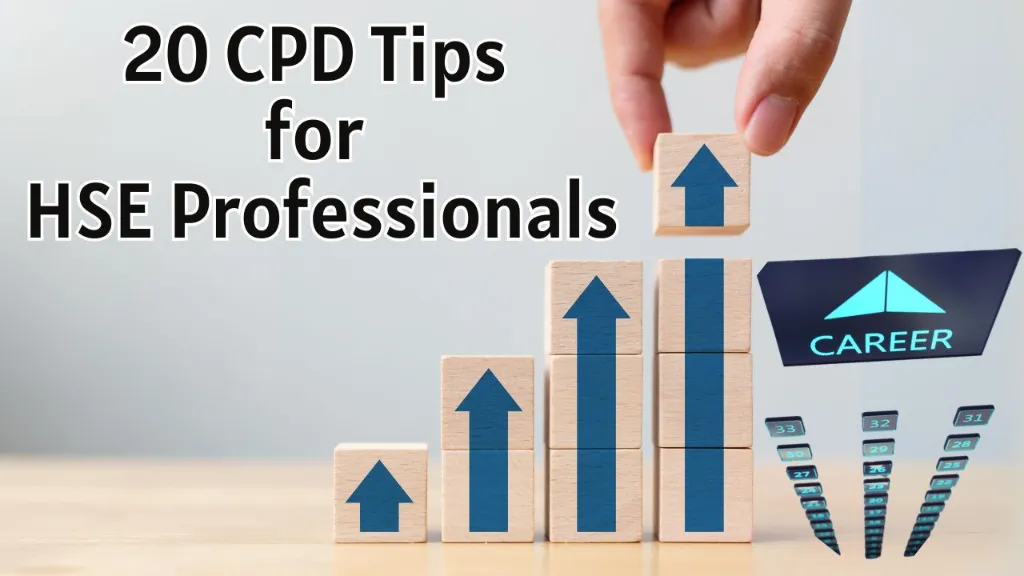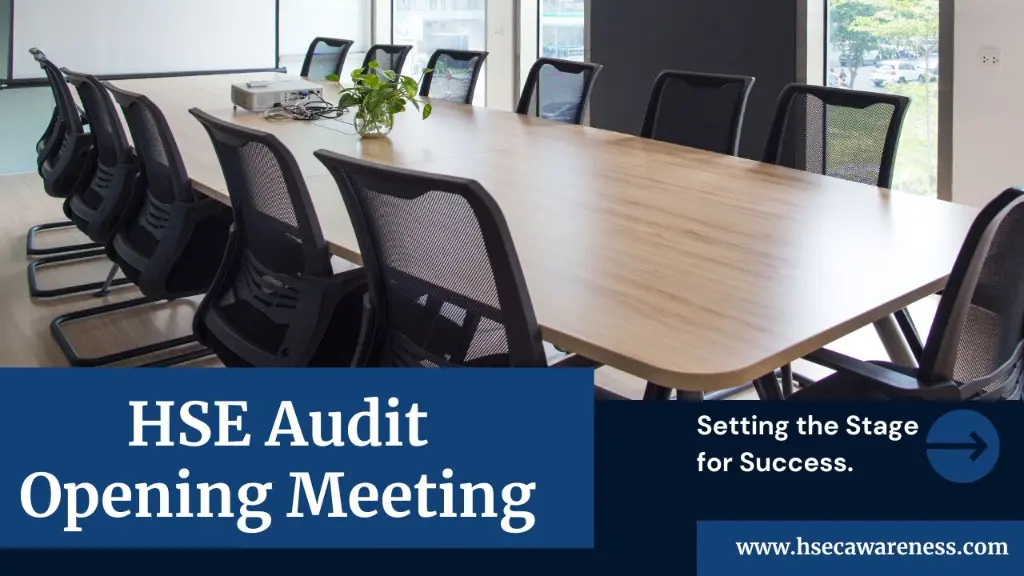Explore our latest blog post, ’20 CPD Tips for HSE Professionals: How to Become an HSE Leader.’ Discover essential strategies, dive into the world of professional development and emerge as a confident HSE leader equipped with the knowledge and skills to make a lasting impact.
From embracing AI to fostering mental well-being, learn how to stay ahead in the ever-changing world of workplace safety. Join us on this empowering journey of growth and transformation.
20 CPD Tips for HSE Professionals: How to Become an HSE Leader through Continuing professional development (CPD) journey
Have you ever wondered what makes a HSE Professional truly exceptional and an HSE Leader?
It is not just the hard hat and the regulations book. It is an endless curiosity, the thirst for knowledge and the drive to make every workplace as safe as possible.
In the ever-evolving landscape of workplace safety, being a Health, Safety and Environment (HSE) professional demands continuous growth, both professionally and personally.
Phenomenal HSE professionals are always learning and growing. They are not afraid to challenge the status quo and come up with new and innovative ways to stay current in their field and enhance knowledge as well as experience.
In this blog we will discuss 20 CPD Tips for HSE Professionals to boost their career through Continuing professional development (CPD) journey and become an HSE Leader.
1. Staying informed:
The world of health and safety is dynamic and always evolving. It is about subscribing to industry publications, following subject experts & leaders on social media and keeping an eye on the pulse of emerging trends and regulations.
2. Taking Formal Courses:
Next, consider pursuing advanced degrees or certifications in occupational health and safety such as Certified Safety Professional, Certified Industrial Hygienist, Health & Safety Management, Environment Management etc.
These courses or certifications not only demonstrate your commitment to continuous improvement but also deepen your understanding.
3. Professional Associations or Membership:
Being a part of professional associations like the American Society of Safety Professionals (ASSP) or the Institution of Occupational Safety and Health (IOSH) can open up a world full of valuable resources. Plus, they offer ample opportunities for networking and learning.
These Memberships often include access to resources, conferences, and networking opportunities. It’s like having a supportive family in your professional journey.
4. Continued Education:
Never underestimate the power of continued education and you should continue even after receiving certification or a degree. Participate in ongoing training and development programs to stay sharp and up to date.
Many organisations offer in-house training or online courses to keep you updated and you should take advantage of these resources. This is a great way to ensure that your skills and knowledge are aligned with the latest industry standards.
5. Workshops and Seminars:
Workshops and seminars, are they worthy? Yes, they are the meeting grounds for learning and networking. Here, you can soak up wisdom from experts, gain practical insights, and connect with like-minded professionals within your field of expertise.
6. Gain Practical Experience:
Gaining Practical Experience is priceless. Seek opportunities to apply your knowledge in real-life settings. Take on challenging projects, volunteer for safety-related initiatives, and learn by doing.
This is a great way to gain valuable experience and develop your skills. Hands-on experience is a game-changer!
7. Embrace Technology including Artificial Intelligence (AI):
In today’s digital age, knowing and adopting technology is not any more a choice; It’s a necessity.
Stay updated and Embrace on technology and software tools such as AI-driven risk assessment tools, data analytics platforms, incident reporting software etc. This will help you to be more efficient and effective in your role.
By harnessing the potential of technology, you can predict, prevent, and protect with unprecedented precision.
8. Mentorship:
Mentorship can be a game-changer. Seek out experienced HSE professionals who can guide you, share their wisdom, and offer professional advice.
Learning from their successes and challenges can fast-track your growth.
9. Study Case Studies:
Real-life incidents teach us a lot. Read Case Studies to understand the causes and lessons learned. Analyzing these studies can sharpen your problem-solving skills thus making you a more effective professional.
10. Safety Committees:
Join safety committees within your organization or industry. They are platforms where you can contribute to and learn from collective efforts to improve safety policies and practices.
This is a great way to gain valuable experience and insights.
11. Developing Soft Skills:
Don’t forget about Soft Skills. Effective communication, leadership, and teamwork are the pillars of success in any profession. Work on developing these skills to excel in your health and safety career.
Moreover, in today’s diverse workplaces, effective communication is key. Sharpen your communication skills, especially in multicultural settings. Being adept at communicating safety protocols across languages and cultures ensures everyone comprehends and follows safety guidelines, fostering a united and secure work environment.
12. Continuously Assess and Improve:
Regularly evaluate your performance, identify areas of improvement, and refine your skills based on feedback from peers and supervisors.
This is an important part of continuous improvement, as it allows you to identify and address your weaknesses. Remember, growth is a continuous journey.
13. Embrace Diversity and Inclusion:
In the modern safety era, understanding different perspectives is vital. Embrace diversity and inclusion within your teams. Encourage varied voices and experiences, creating an environment where everyone feels heard and valued.
14. Cultivate Empathy:
Safety isn’t just about rules; it’s about people. Cultivate empathy in your approach and master yourself to understand the fears and concerns of your colleagues.
When people feel genuinely cared for, they are more likely to adhere to safety protocols willingly and you will gain their respect.
15. Legal and Ethical Knowledge:
Stay updated on legal and ethical aspects related to workplace safety. Laws change, and ethical standards evolve. By being well-versed in the legal framework, you ensure your organization operates within the boundaries of the law, safeguarding not just lives but also the company’s integrity.
16. Stay Agile and Adaptive:
The modern safety landscape is dynamic. Stay agile and adaptive in your methods. Continuously assess risks, update protocols, and be ready to pivot swiftly in response to emerging challenges.
17. Promote Mental Health and Well-being:
The modern workplace isn’t just about physical safety; it’s about mental well-being too. Therefore, staying updated on mental health awareness programs and initiatives is quite important for HSE Professional.
Understanding the signs of stress and burnout equips you to create environments where employees feel supported and valued, fostering a culture of holistic safety. Encourage open conversations, provide resources, and promote a supportive atmosphere where seeking help is not stigmatised.
18. Master in Crisis Management and Emergency Response:
Crisis situations demand swift and well-coordinated responses. Enrol in specialised courses focusing on crisis management and emergency response protocols.
By honing your skills in handling high-pressure situations, you become the beacon of calm in the storm, ensuring the safety of everyone around you.
19. Stay Green and Sustainable:
Sustainability is not just a trend; it’s a responsibility. Thus, stay updated on eco-friendly technologies, green certifications, and sustainable practices. By integrating environmental considerations into safety protocols, you contribute to a healthier planet while ensuring the well-being of those you protect.
20. Networking:
Networking is key. Build a robust professional network within the health and safety community. Attend events, connect with colleagues, and participate in online forums or LinkedIn groups.
In addition to the above tips, HSE professionals should also regularly review their own career goals and identify areas where they need to improve. This could involve taking a skills assessment, seeking feedback from peers and supervisors, or talking to a career counsellor.
By following these tips, HSE professionals can stay up-to-date with the latest trends and best practices, develop their skills and knowledge, and make a significant contribution to the safety of the modern workplace.
For future updates, suggestion and discussion, please connect with us on Facebook, Twitter & Linkedin.






